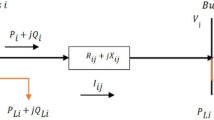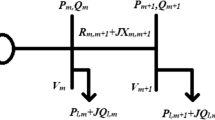Abstract
This paper proposes an improved version of the artificial ecosystem-based optimization (AEO) algorithm called artificial ecosystem-based optimization–opposition-based learning (AEO-OBL), with the aim of improving the performance of the original AEO. In addition, it is utilized for determining the optimal allocation of distributed generation (DG) units in radial distribution networks (RDNs) with the aim of minimizing power and energy losses. The stochastic nature of renewable DGs such as wind turbine and photovoltaic generation is taken in consideration using appropriate probability models. The Loss Sensitivity Index is used to assess the most suitable busses for the integration of DG units in the RDN. AEO is nature-inspired optimization algorithm which imitates the flow of energy in an ecosystem on earth. In the proposed AEO-OBL, the search ability and the balance between the exploration and exploitation phases in the original AEO are enhanced. In the AEO-OBL, five efficient strategies are used to avoid falling on a local optimal: (1) enhanced linear weight coefficient a, (2) production operator, (3) modified consumption operator, (4) modified decomposing operator and (5) opposition-based learning (OBL). The performance of the proposed technique is validated on IEEE 33-bus and 85-bus RDNs. To emphasize the superiority of the proposed technique, the results are compared with the original AEO, Henry gas solubility optimizer (HGSO) and Harris hawks optimization (HHO) algorithm results. Besides, the developed algorithm is compared with other optimization algorithms in literature that solved the same problem. The outcomes indicate a better performance of AEO-OBL relative to other algorithms. Accordingly, AEO-OBL can be a very suitable algorithm in solving the problem of optimal DG allocation in RDNs.





























Similar content being viewed by others
Explore related subjects
Discover the latest articles, news and stories from top researchers in related subjects.References
Khasanov M, Kamel S, Tostado-Véliz M, Jurado F (2020) Allocation of photovoltaic and wind turbine based dg units using artificial ecosystem-based optimization. In: 2020 IEEE international conference on environment and electrical engineering and 2020 IEEE industrial and commercial power systems europe (EEEIC / I&CPS Europe). https://doi.org/10.1109/eeeic/icpseurope49358.2020.9160696
Khasanov M, Kamel S, Xie K, Zhou P, Li B (2019) Allocation of distributed generation in radial distribution networks using an efficient hybrid optimization algorithm. In: 2019 IEEE innovative smart grid technologies - Asia (ISGT Asia). https://doi.org/10.1109/isgt-asia.2019.8881709
Elkadeem MR, Elaziz MA, Ullah Z, Wang S, Sharshir SW (2019) Optimal planning of renewable energy-integrated distribution system considering uncertainties. IEEE Access 7:164887–164907
Zhou Y, Wang C, Wu J, Wang J, Cheng M, Li G (2017) Optimal scheduling of aggregated thermostatically controlled loads with renewable generation in the intraday electricity market. Appl Energy 188:456–465
El-Fergany A (2015) Optimal allocation of multi-type distributed generators using backtracking search optimization algorithm. Int J Electr Power Energy Syst 64:1197–1205
Eid A (2020) Allocation of distributed generations in radial distribution systems using adaptive PSO and modified GSA multi-objective optimizations. Alex Eng J 59(6):4771–4786
Sobieh A, Mandour M, Saied EM, Salama MM (2017) Optimal number size and location of distributed generation units in radial distribution systems using Grey Wolf optimizer. Int Electr Eng J 7(9):2367–2376
Kansal S, Kumar V, Tyagi B (2016) Hybrid approach for optimal place- ment of multiple DGs of multiple types in distribution networks. Int J Electric Power Energy Syst 75:226–235
Hassan AA, Fahmy FH, Nafeh AESA, Abu-Elmagd MA (2017) Genetic single objective optimisation for sizing and allocation of renewable DG systems. Int J Sustain Energ 36(6):545–562
Kamel S (2019) Optimal DG allocation for enhancing voltage stability and minimizing power loss using hybrid gray wolf optimizer. Turk J Electr Eng Comput Sci 27:2947–2961
Khasanov M, Kamel S, Mawgoud H (2019) Minimizing power loss and improving voltage stability in distribution system through optimal allocation of distributed generation using electrostatic discharge algorithm 21st Int Middle East Power Syst Conf (MEPCON) pp 354–359
Khatod DK, Pant V, Sharma J (2013) Evolutionary programming based optimal placement of renewable distributed generators. IEEE Trans Power Syst 28(2):683–695
Atwa YM, El-Saadany EF, Salama MMA, Seethapathy R (2010) Optimal renewable resources mix for distribution system energy loss minimization. IEEE Trans Power Syst 25(1):360–370
Abdelaziz AY, Hegazy YG, El-Khattam W, Othman MM (2015) Optimal allocation of stochastically dependent renewable energy based distributed generators in unbalanced distribution networks. Elect Power Syst Res 119:34–44. https://doi.org/10.1016/j.epsr.2014.09.005
Salameh ZM, Borowy BS, Amin AR (1995) Photovoltaic module- site matching based on the capacity factors. IEEE Transactions Energy Convers 10:326–332
Teng JH et al (2012) Optimal charging/discharging scheduling of battery storage systems for distribution systems interconnected with sizeable PV generation systems. IEEE Transactions Power Syst 28:1425–1433
Abdel-Mawgoud H (2021) A strategy for PV and BESS allocation con- sidering uncertainty based on a modified Henry gas solubility optimizer. Electric Power Syst Res 191:106886–106886
Khasanov M (2021) Optimal distributed generation and battery energy storage units integration in distribution systems considering power generation uncertainty. IET Gener Transm Distrib 15:3400–3422
Negi G (2021) Optimization of complex system reliability using hybrid grey wolf optimizer. Decis Mak Appl Manag Eng 4:241–256
Barma PS, Dutta J, Mukherjee A (2019) A 2-opt guided discrete antlion optimization algorithm for multi-depot vehicle routing problem. Decis Mak Appl Manag Eng 2:112–125
Maleki A, Nazari MA, Pourfayaz F (2020) ‘Harmony search optimization for optimum sizing of hybrid solar schemes based on battery storage unit. Energy Rep 6:102–111
Cai W (2020) Optimal sizing and location based on economic parameters for an off-grid application of a hybrid system with photovoltaic, battery and diesel technology. Energy 201:117480. https://doi.org/10.1016/j.energy.2020.117480
Zhang G (2020) Optimal location and size of a grid-independent solar/hydrogen system for rural areas using an efficient heuristic approach. Renew Energy 156:1203–1214
Mahmoudi SM (2021) Optimization of a hybrid energy system with/without considering back-up system by a new technique based on fuzzy logic controller. Energy Convers Manag 229:113723–113723
Kayal P, Chanda CK (2015) Optimal mix of solar and wind distributed generations considering performance improvement of electrical distribution network. Renew Energy 75:173–186
Hung DQ, Mithulananthan N, Bansal RC (2014) Integration of PV and BES units in commercial distribution systems considering energy loss and voltage stability. Appl Energy 113:1162–1170
Heidari AA, Mirjalili S, Faris H, Aljarah I, Mafarja M, Chen H (2019) Harris hawks optimization: algorithm and applications. Futur Gener Comput Syst 97:849–872
Hashim FA, Houssein EH, Mabrouk MS, Al-Atabany W, Mirjalili S (2019) Henry gas solubility optimization: a novel physics-based algorithm. Futur Gener Comput Syst 101:646–667
Zhang P, Li W (2009) Boundary analysis of distribution reliability and economic assessment. IEEE Trans Power Syst 25(2):714–721
Selvan MP, Swarup KS (2004) Distribution system load flow using object- oriented methodology. Power System Technol 2:1168–1173
Chang GW, Chu SY, Wang HL (2007) An improved backward/forward sweep load flow algorithm for radial distribution systems. IEEE Transactions Power Syst 22(2):882–884
Arya LD, Koshti A, Choube SC (2012) Distributed generation planning using differential evolution accounting voltage stability consideration. Int J Electr Power Energy Syst 42(1):196–207
Hung DQ, Mithulananthan N, Bansal RC (2010) Analytical expressions for DG allocation in primary distribution networks. IEEE Trans Energy Convers 25(3):814–820
Karaboga D, Basturk B (2007) A powerful and efficient algorithm for numerical function optimization: artificial bee colony (ABC) algorithm. J Global Optim 39(3):459–471
Zhao W, Wang L, Zhang Z (2019) Artificial ecosystem-based optimization: a novel nature-inspired meta-heuristic algorithm. Neural Comput Appl 32(13):9383–9425. https://doi.org/10.1007/s00521-019-04452-x
Xu Q, Wang L, Wang N, Hei X, Zhao L (2005) A review of opposition-based learning from. Eng Appl Artif Intell 29:1–12
Kaveh A, Dadras A (2017) A novel meta-heuristic optimization algorithm: thermal exchange opti- mization. Adv Eng Softw 110:69–84
Mirjalili S, Lewis A (2016) The whale optimization algorithm. Adv Eng Softw 95:51–67
Mirjalili S (2016) SCA: a sine cosine algorithm for solving optimization problems. Knowl-Based Syst 96:120–133
Saremi S, Mirjalili S, Lewis A (2017) Grasshopper optimisation algorithm: theory and application. Adv Eng Softw 105:30–47
Arcuri A, Fraser G (2013) Parameter tuning or default values? An empirical investigation in search- based software engineering. Empir Softw Eng 18(3):594–623
Mohamed AW, Hadi AA, Mohamed AK, Awad NH (2020) Evaluating the performance of adaptive gaining sharing knowledge based algorithm on CEC 2020 benchmark problems. IEEE Congress on Evolutionary Computation (CEC) pp 1–8
Wilcoxon F (1992) Individual comparisons by ranking methods. In: Kotz S, Johnson NL (eds) Breakthroughs in statistics. Springer series in statistics. Springer, New York, NY. https://doi.org/10.1007/978-1-4612-4380-9_16
Baran ME, Wu FF (1989) network reconfiguration in distribution systems for loss reduction and load balancing. IEEE Power Eng Rev 9(4):101–102
Rana AD, Darji JB, Pandya M (2014) Backward/forward sweep load flow algorithm for radial distribution system. Int J Sci Res Dev 2(1):398–400
Shuaib YM, Kalavathi MS, Rajan CCA (2015) Optimal capacitor placement in radial distribution system using gravitational search algorithm. Int J Electr Power Energy Syst 64:384–397
Acknowledgements
The authors thank the support of the National Research and Development Agency of Chile (ANID), ANID/Fondap/15110019.
Author information
Authors and Affiliations
Corresponding author
Ethics declarations
Conflict of interest
The authors declare no conflict of interest.
Additional information
Publisher's Note
Springer Nature remains neutral with regard to jurisdictional claims in published maps and institutional affiliations.
Rights and permissions
Springer Nature or its licensor holds exclusive rights to this article under a publishing agreement with the author(s) or other rightsholder(s); author self-archiving of the accepted manuscript version of this article is solely governed by the terms of such publishing agreement and applicable law.
About this article
Cite this article
Khasanov, M., Kamel, S., Halim Houssein, E. et al. Optimal allocation strategy of photovoltaic- and wind turbine-based distributed generation units in radial distribution networks considering uncertainty. Neural Comput & Applic 35, 2883–2908 (2023). https://doi.org/10.1007/s00521-022-07715-2
Received:
Accepted:
Published:
Issue Date:
DOI: https://doi.org/10.1007/s00521-022-07715-2




